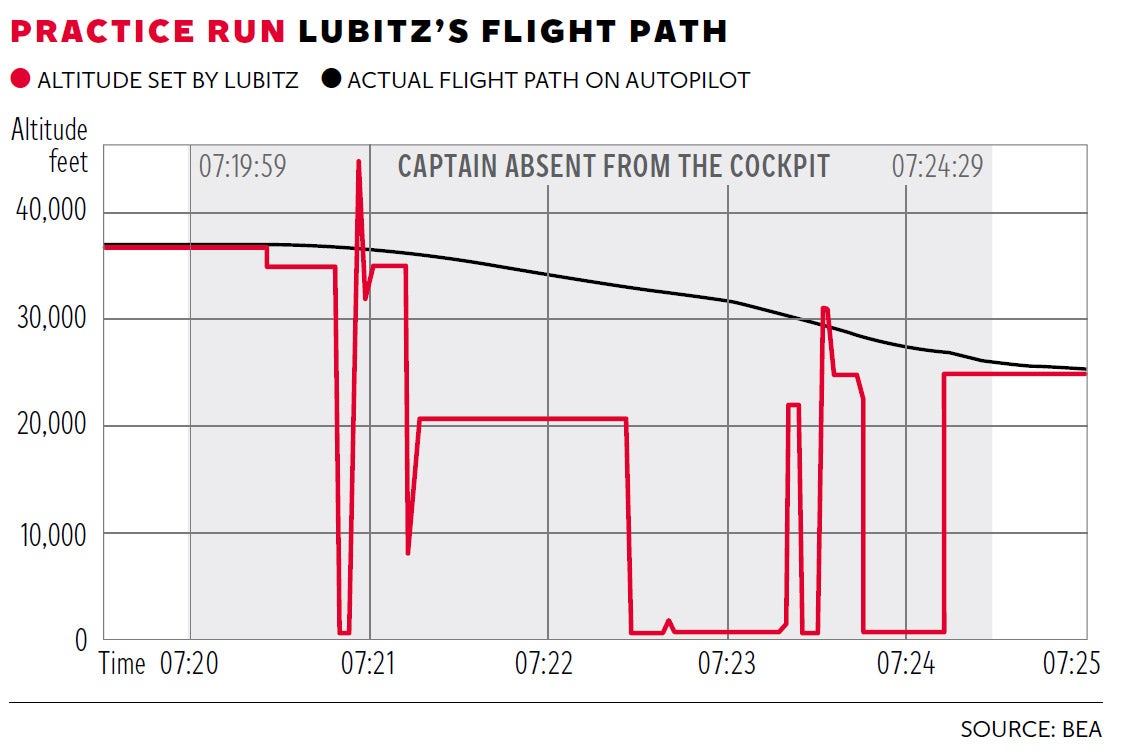Germanwings crash: Andreas Lubitz practised a controlled descent five times on previous flight
Black box reveals co-pilot repeatedly put Airbus A320 on collision course but cancelled instructions before anyone could tell

The co-pilot of the Germanwings aircraft which crashed into the French Alps in March rehearsed the destruction of the aircraft during its outward flight to Barcelona, it has emerged.
Andreas Lubitz placed the Airbus A320 on a collision course with the ground five times in four minutes but cancelled the instructions before any loss of height became apparent, according to a preliminary report on the disaster.
French accident investigators are unsure whether Lubitz, 27, was contemplating an act of mass murder on the outward flight from Düsseldorf on 24 March or whether he was just practising his plan to destroy the jetliner. “I cannot speculate on what was happening inside his head,” said Rémi Jouty, head of the Bureau d’Enquêtes et d’Analyses (BEA). “All I can say is that he changed the [automatic pilot[ to the minimum setting of 100ft and he did it several times.”
The findings provide new evidence that Lubitz’s actions two hours later – flying the aeroplane at high speed into a mountain in the French Alps, killing all 150 people on board – were planned and not an act of spur-of-the-moment madness. The rest of the 30-page interim report from the BEA broadly confirmed information that had already been released or leaked.
On the return Barcelona to Düsseldorf flight, Lubitz locked the senior pilot out of the cabin when he went to the toilet. He then set the autopilot to 100ft, ignored a dozen automatic and ground control warnings, boosted the power of the engines until the aircraft flew at full tilt into the side of a mountain 100 miles north of Nice, the report said.
As the aircraft careered towards destruction, Lubitz impeded frantic attempts by his senior pilot to open the cockpit door. He blocked the normal entry code and then ignored loud hammering.
The two black box flight recorders found at the crash scene – covering all of the aircraft’s movements that day – suggest that the senior pilot also left the cockpit as the Germanwings plane flew south towards Barcelona earlier that day. The BEA report said that Lubitz then interfered with the automatic pilot altitude settings on five occasions in just over four minutes. As the plane flew over the Mediterranean, he was instructed by air-traffic control to descend to 35,000ft. Instead, he selected 100ft, then 49,000ft, then 35,000ft.
When told to descend to 21,000ft, he set the controls for 100ft several times. The cockpit voice recorder then picked ups noises which suggest that the senior pilot had returned to his seat.
In each case, the changes were cancelled so quickly that neither the passengers nor the crew probably felt any “appreciable effect”, Mr Jouty said. The senior pilot, Patrick Sondheiner, would therefore have had no reason to suspect that his colleague was planning to destroy the aircraft.
The final BEA report, to be released some time next year, will examine factors that may have helped to produce the calamity. It may recommend new rules for mental health checks on pilots and a re-examination of the systems for locking cockpit doors imposed after the 9/11 hijackings and terrorist attacks in the US.

Mr Jouty said his team would look at the “current balance between medical confidentiality and flight safety”. They would also revisit the “compromises” made between different threats to security when unbreachable locks were placed on the cockpit doors of airliners.
Lubitz is known to have had problems with depression during his pilot training, but Lufthansa, the parent company of Germanwings, said that his regular medical checks had revealed no problems. Evidence uncovered by German investigators at Lubitz’s home at Montabaur, in the Rhineland, suggest that he destroyed doctors’ notes advising him to take time off work. He had also studied suicide techniques on the internet.
The interim BEA report said it would now examine the “psychological aptitude” of pilots – “how it can arise that a pilot finds himself alone in a cockpit with the intention of destroying the aircraft and its occupants”.
Join our commenting forum
Join thought-provoking conversations, follow other Independent readers and see their replies
Comments
Bookmark popover
Removed from bookmarks